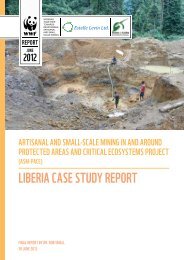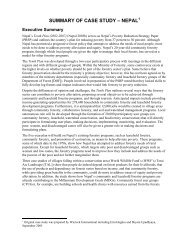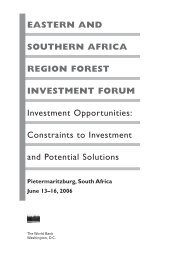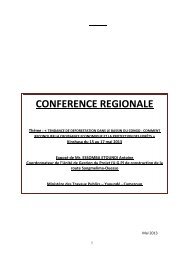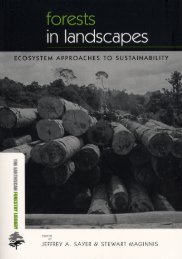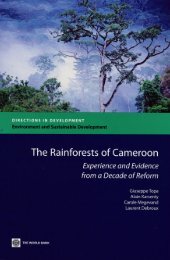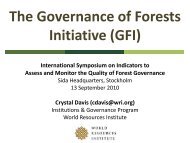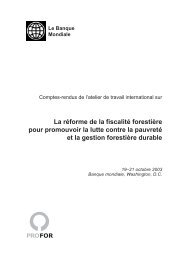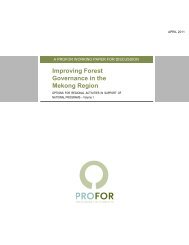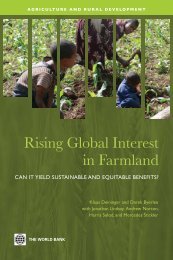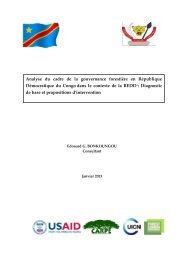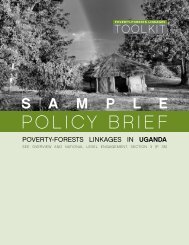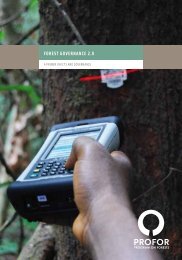Managing the Miombo Woodlands of Southern Africa - PROFOR
Managing the Miombo Woodlands of Southern Africa - PROFOR
Managing the Miombo Woodlands of Southern Africa - PROFOR
You also want an ePaper? Increase the reach of your titles
YUMPU automatically turns print PDFs into web optimized ePapers that Google loves.
and getting timber through checkpoints.” Salomão and Matose (technical annex 5) also indicate<br />
how communities are limited from participating in market initiatives because <strong>of</strong> <strong>the</strong> complex set <strong>of</strong><br />
conditions and regulations for such participation.<br />
The problem <strong>of</strong> devolution<br />
Section 2 <strong>of</strong> this paper points out that <strong>the</strong> devolution <strong>of</strong> rights <strong>of</strong> tenure, use, and access is an<br />
important trend across sou<strong>the</strong>rn <strong>Africa</strong>, and poses good opportunities for improving miombo<br />
management. This trend also poses special challenges, and, when poorly implemented, can even<br />
undermine efforts to improve management.<br />
Problems arise when devolution is incomplete, or o<strong>the</strong>rwise reduces clarity with respect to who has<br />
local rights to use and management. Wily (1999) convincingly argues that full power (rights <strong>of</strong> access,<br />
use, control, and ownership), not just rights <strong>of</strong> use, needs to be devolved to local communities.<br />
Experience has increasingly shown that pilot schemes which don’t give meaningful power to local<br />
actors are unlikely to be successful (Matose 2006; Wily 1999). Schafer and Bell (2002), based on<br />
experience in Mozambique, suggest that <strong>the</strong> state’s reluctance (regardless <strong>of</strong> what “policy” says—see<br />
also Salomão and Matose in technical annex 5) to take measures to devolve control over natural<br />
resources stems from <strong>the</strong> desire <strong>of</strong> forestry personnel to protect <strong>the</strong> forests above all else, <strong>the</strong><br />
economic interests <strong>of</strong> state agents in valuable natural resources, and <strong>the</strong> unwillingness <strong>of</strong> politicians<br />
to allow local control in areas that are politically sympa<strong>the</strong>tic to <strong>the</strong> opposition.<br />
In a number <strong>of</strong> countries, <strong>the</strong> wider policy framework is simply not conducive to local control (e.g.,<br />
Blaikie 2006; Campbell et al. 2001). Progress with participatory forest management has been slow<br />
in Zambia because <strong>of</strong> <strong>the</strong> lack <strong>of</strong> a sound policy and legal framework (Gibbon et al. 2005). In some<br />
cases <strong>the</strong>re are good policies in place (e.g., Tanzania) and decentralized management has been<br />
mainstreamed throughout <strong>the</strong> forestry sector. But even here <strong>the</strong>re are critics. For example, Petersen<br />
and Sandhövel (2001) point to lack <strong>of</strong> clear rights and adverse incentives, while Meshack et al.<br />
(2006) have recorded <strong>the</strong> high transaction costs <strong>of</strong> local control, and suggest that <strong>the</strong>se are highest<br />
for <strong>the</strong> poorest <strong>of</strong> <strong>the</strong> poor. They conclude that policies and legislation need to be simplifi ed in order<br />
to reduce transactions costs. In many places initiatives are still at <strong>the</strong> planning and experimental<br />
stage, and <strong>of</strong>ten are <strong>of</strong> top-down design (Wily 2003). System design is <strong>of</strong>ten awkward, unrealistic,<br />
expensive, and overly complex, and thus lacks <strong>the</strong> simplicity essential for widespread adoption and<br />
real involvement <strong>of</strong> local communities in woodlands management. Goldman (2003), working in<br />
community-based conservation in Tanzania, also suggests that planning remains a top-down affair,<br />
despite <strong>the</strong> rhetoric.<br />
One manifestation <strong>of</strong> <strong>the</strong> lack <strong>of</strong> commitment to devolution is <strong>the</strong> focus for devolution efforts on<br />
degraded resources ra<strong>the</strong>r than on high-quality woodlands. Ano<strong>the</strong>r manifestation is <strong>the</strong> limited<br />
benefi ts that local producers are allocated. In Mozambique, <strong>the</strong> national forest regulation establishes<br />
that only 20 percent <strong>of</strong> <strong>the</strong> taxes resulting from <strong>the</strong> extraction and use <strong>of</strong> forests and wildlife should<br />
be returned to <strong>the</strong> communities living within or close to <strong>the</strong> forest areas. As a result <strong>of</strong> that measure,<br />
only US$422,000 (in 2006) was returned to <strong>the</strong> 956 communities living in <strong>the</strong> area (Sitoe et al.,<br />
unpublished manuscript).<br />
Chapter 3. DIAGNOSIS: WHY IS MIOMBO NOT BETTER MANAGED<br />
39



